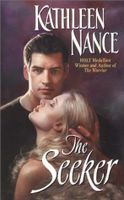
As far as I can tell, before she published the two books that brought her name to my attention (Jigsaw and Day of Fire), Kathleen Nance wrote two groups of books. There are her djinn books, like the one I read recently, More Than Magic, and there are her Greek mythology-related books, like this one, The Seeker.
Stuck with her sister's two sets of teenage twins and a magic show about to go on tour, Dia Trelawny needs help fast. Her irresponsible sibling has disappeared as inexplicably as a rabbit in a hat, but Dia has learned of a man who specializes in finding missing persons, no matter how lost. Hugh Pendragon's piercing green eyes appear to look right into Dia's soul, reading her anxiety about her sister, her unexpected attraction to him. Dark and mysterious, he seems a creature of moonbeams and nighttime, while she lives in the spotlight. But as he draws her into his web of seduction, she wonders which of them is the true magician. She may be a mistress of illusion, but Hugh has performed real magic in bringing her heart back from the dead.This book has at its core a very appealing romance. Unfortunately, much of what surrounds this romance only distracts from it, and doesn't really add anything. A B-.
Dia Trelawny is a magician with a show on her hands that could be about to go big. Dia comes from a family of fakes and conwomen, and her mother and sister still specialize in putting on fake séances and the like. She always hated having to help her mother trick people, and so she decided on a line of work that took advantage of her innate talents, but in a way that makes it clear that what she's doing is an illusion.
A few days before her show is due to go on a tour that's crucial to the future development of her career, Dia receives a huge surprise. Her sister has gone after a rich man she means to marry, and she's sent Dia her four kids, accompanied by a note that says, in essence "You don't mind, do you, darling?".
With her upcoming tour and her very demanding schedule, there's no way Dia can take care of the children, so she decides to go to a private detective. And the man she chooses is Hugh Pendragon, who she met in a friend's wedding. She had found him attractive, and she got the impression he felt the same way, but they haven't seen each other ever since.
She doesn't find Hugh in the best of moods. He has temporarily retired from his usual missing person cases, because the visions he used to rely on to solve his cases have disappeared in the last few months, and he's in a bit of a funk over that. When Dia comes to hire him, Hugh turns her down, but he then reconsiders when handling an earring she left behind triggers a vision.
And so Hugh begins to work to find Dia's sister, and they become closer and closer. But Dia is in trouble: a few months earlier, she performed a magic trick at a museum, and a very unscrupulous woman used her as a front to steal some of the jewels involved in the trick. Jewels, she discovers later, belonged to Hugh. Jewels, he's began to suspect, are linked to his visions.
You'll notice that I haven't mentioned any of those Greek mythology elements I talked about above. That's because, though there was a lot of space devoted to them, they weren't really relevant to the story. Yes, the jewelry Dia unwittingly helped steal from Hugh were a couple of bracelets that used to belong to Hades, "the Seeker", and the woman who used Dia to steal them is the goddess Demeter, but that's about it. Both these elements could have been very easily changed to something not related to Greek mythology without losing anything.
And anyway, a lot of the space spent of gods and godesses and such wasn't spent on these two things, which were at least related to the central story, but on Hera and Zeus and their plans to matchmake for Dia and Hugh. There's pages and pages about how what were known as "gods" in Ancient Greece weren't really gods, but extremely powerful beings from another planet, who thought it was fun to be worshipped as deities (hmmm, Roberta Gellis did something similar once. I read one of those books, Shimmering Splendor, not that long ago), and about how Zeus and Hera are not posing as gods anymore, but now simply live among humans, many of whom are actually descended from them.
Lots and lots of pages are spent on Zeus and Hera's reconciliation, too, which was something I couldn't care less about (they separated after Zeus' constant infidelities.... so romantic, that). Plus, it was something that had obviously started in an earlier book, so both their rapprochement and that whole deal about acting as matchmakers for people descended from the gods read as a continuation of something I never got to know how it started.
And in the same way as all this crap about gods is distracting me from the main story in this review, it distracted me from it in the book.
And it's a shame, because it was a lovely romance. I especially enjoyed Hugh, serious, intense Hugh, who falls like a stone for Dia and can't keep away from her, no matter how much she tries to stay back. And Dia was great, too. At one point I feared a silly conflict would develop between them because of her insistence on not asking for his help with her problems, but Nance neatly avoided that, and the ending was very nicely done.
This book comes after The Warrior and The Trickster. I'm planning to give them a try.. maybe the gods aren't as irrelevan there as they were here.
No comments:
Post a Comment